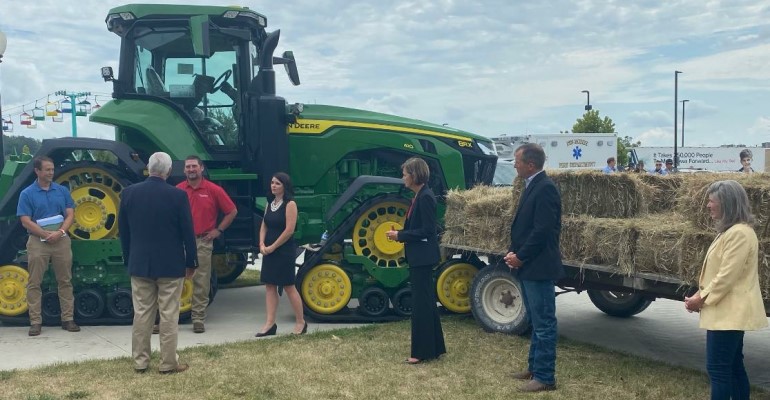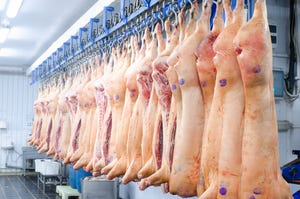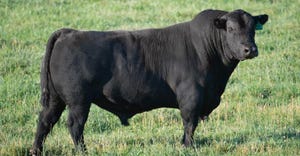VP Pence speech to farmers falls flat
Storm devastation deals another blow to Midwest farmers already faced with trade and ethanol woes.

Vice President Mike Pence visited Des Moines, Iowa, on Thursday to re-launch the Trump campaign’s Farmers & Ranchers for Trump. However, to a room full of farmer supporters his message came off more as a campaign speech, and less understanding of the devastation that just swept through the state days prior, to compound an already bad situation in farm country.
Vinton, Iowa farmer Lance Lillibridge said Pence’s speech did say “We put farmers first” but as far as agriculture goes, Lillibridge said there’s a lot of misgivings about this Administration. “We’re at our wit’s end with small refinery waivers and trade wars. And then this COVID thing. Now a huge storm blasts Iowa and steam rolls us.
“We need more than a campaign speech right now,” Lillibridge said.
The Derecho storm wiped out an estimated 10 million acres of corn when it swept through Iowa on Monday, Aug. 10, and may have destroyed an estimated 20% of storage in the state and as much as 50% of the storage damaged, according to Iowa farmer Lance Lillibridge.
Tim Bardole, president of the Iowa Soybean Assn., who farms 2,500 acres of corn and soybeans near Rippey, Iowa, shared with the vice president that all of his corn acres are virtually flat following the storm, and half of his soybean acres were hit with hail. Bardole was one of five producers along with Iowa Gov. Kim Reynolds, Iowa Secretary of Agriculture Mike Naig and Sen. Joni Ernst (R., Iowa) who spoke with Pence ahead of the event.
Lillibridge, who farms 1,100 acres of corn, 400 acres of soybeans and 100 acres of alfalfa hay said the uncertainty facing him has been larger than it’s ever been before on his farm operation.
Lillibridge said it hasn’t always been easy with historic floods in 2008 and damaging winds in 2011 followed by the 2012 drought. But he was able to persevere and come out on the other hand stronger because of the ethanol industry and trade.
In the brief exchange with Pence and Lillibridge who serves as a district representative on the Iowa Corn Growers Assn., he said Pence recognized the importance of ethanol. “He looked me in the eyes and said, ‘We need ethanol and need to get rid of these small refinery exemptions.’”
In a letter to the vice president ahead of his arrival, leaders from the Iowa Corn Growers Assn., Iowa Soybean Assn., Iowa Renewable Fuels Assn. and Iowa Biodiesel Board called for President Trump to immediately order Environmental Protection Agency Administration Andrew Wheeler to reject all the nearly 60 new RFS exemption petitions and apply the 10th Circuit decision to all pending RFS refinery exemption requests.
However, Bardole said in a private meeting with the vice president prior to his speech with Iowa leaders including Ernst, Pence seemed unaware of what was going on with the waivers when he turned to Ernst and said “didn’t we take care of this.”
Currently the EPA is considering 58 waivers that go back before the court ruling would be in effect.
He definitely implied the Administration would deal with it, Bardole said of the discussion with Pence. “Hopefully that means they won’t be approved.”
The letter stated, “Make no mistake, these issues are being discussed daily around the state and it is often reported back to us that Iowans are saying: ‘If we can’t trust the Trump Administration to do the right thing before the election, then why on Earth would we expect them to treat us fairly after the election.’”
Lillibridge said if the administration were to take action on the SREs before the election “they would have a whole bunch more votes in Iowa.”
Both Lillibridge and Bardole question what it might look like with another four years for farmers under Trump.
“I’m not sure we can afford four more years, but not sure if it goes the other way if we can either,” Lillibridge said.
Bardole said, “I’m not thrilled with everything this administration has done. I truly believe the country is in a better place now than it would have been under Hillary Clinton.”
He went on to share he’s very concerned how the Trump Administration could change without the need to get re-elected if he wins in 2020. Although Trump touts how he loves farmers, it doesn’t always feel like he’s not acting a certain way just to get re-elected, he shared.
“When you look at policies that Biden is suggesting, and the history of what happened when he was vice president, that’s even more terrifying for production agriculture on what rules and regulations that might be put into effect that damage how we farm and farming as we know it,” Bardole said.
And even though Trump’s handling of trade has hurt farmers, Bardole said he worries that a Biden administration could walk back on progress Trump has tried to make. “If the last couple of years since trade issues started goes back to the old status quo, thaen we’ve lost a lot of money, gained a lot of debt and it was all for not.”
Whatever administration is in office needs to keep pushing and finish pushing China. “Don’t just stop and walk away from it. That’s a big concern with a Biden administration,” Bardole said.
About the Author(s)
You May Also Like




.png?width=300&auto=webp&quality=80&disable=upscale)
